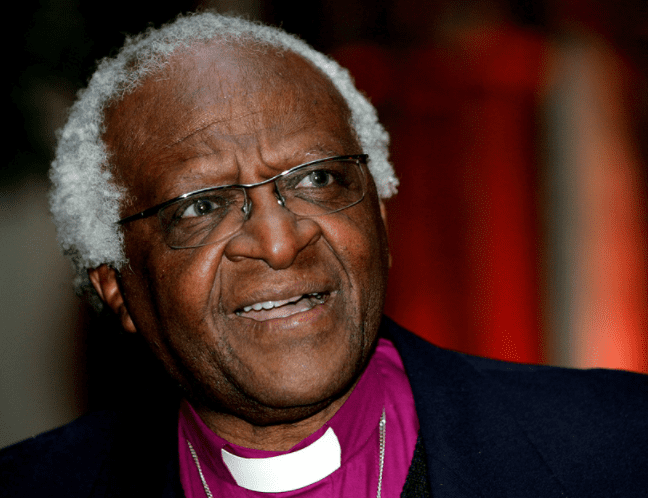1931 – 2021
Amnesty International paid tribute today to one of the world’s dedicated human rights champions, Archbishop Desmond Mpilo Tutu. Tutu passed away on 26 December 2021 at the age of 90.
The death of Archbishop Desmond Mpilo Tutu leaves a big void in the struggle for human rights and freedom around the world. He dedicated his entire life to the fight to create a world where people could be free to claim and exercise their freedoms, without being prejudiced or persecuted for who they are.
The world has lost a dedicated human rights champion. Archbishop Desmond Tutu refused to sit and watch injustice meted out against the people of South Africa by the apartheid government at the time when it was costly to stand up against the regime. He also stood up for the oppressed people elsewhere around the world, ensuring that he spoke out for their freedom.
Deprose Muchena, Amnesty International’s Director for East and Southern Africa.
He will be remembered for standing up for the oppressed people of South Africa during the apartheid government’s segregation and oppression of black people, denying them basic human rights such as freedom of association, movement and assembly.
Archbishop Desmond Tutu has been a fervent supporter of Amnesty International’s human rights work. He supported the organization’s Arms Trade Treaty campaign, an international treaty that sets out robust global rules to stop the flow of weapons, munitions and related items to countries when it is known they would be used to commit or facilitate genocide, crimes against humanity, war crimes and serious human rights violations.
He also worked with the organization to campaign to free political prisoners in Burma in August 2012, including Aung San Suu Kyi.
“Archbishop Desmond Tutu devoted his entire life to ensuring justice for all. He wanted to see a world where all co-existed in peace and harmony, without any prejudice. He is a true example of a selfless human rights fighter,”
He also worked with Amnesty International to champion the rights of LGBTI people. He also supported the organization’s campaign against death penalty, putting pressure on countries still using it as punishment for crime to bring an end to the cruel and inhuman practice.
“Archbishop Desmond Mpilo Tutu leaves a remarkable human rights legacy. It is for us to continue where he left off, to demand better from our governments and to create human rights respecting societies.”
Background
Archbishop Desmond Mpilo Tutu was born in Klerksdorp on 7 October 1931, but later moved to Johannesburg at the age of 12 with his parents.
He studied theology at King’s College in the United Kingdom in the 1960s and later became the Archbishop. He was appointed as General Secretary of the South African Council of Churches in 1978. He became Bishop of Johannesburg in 1985 and in 1986 the Archbishop of Cape Town, the most senior position in southern Africa’s Anglican church hierarchy.
He was awarded the Nobel Prize for Peace in 1984.
He was appointed a patron of the World Campaign Against Military and Nuclear Collaboration with South Africa in 1994.
In 1995 President Nelson Mandela appointed him the Chairperson of the Truth and Reconciliation Commission, a body set up to probe gross human rights violations that occurred under apartheid.
During the 2008-2009 Gaza war, he called the Israeli offensive “war crimes”. He retired from public life in October 2010, but he continued speak out on social justice, freedom and human rights. In September 2012, he called for former US president George W. Bush and former British Prime Minister Tony Blair to be tried for their role in the Iraqi war by the International Criminal Court. Since his retirement, Tutu has worked as a global activist on issues pertaining to democracy, freedom and human rights.


